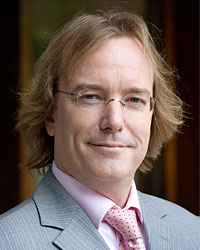Peter Liebregts guest lecturer in Canterbury
At the invitation of the Centre for Early Christianity and Its Reception (CECIR), Peter Liebregts, Full Professor of Modern Literatures in English (LUCAS), visited the University of Kent in Canterbury from March 17 to 20, to give a lecture and a masterclass.
Research focus

In his research, Liebregts, a classicist and Anglicist, focuses on subjects such as the reception and appropriation of classical culture in modern English literature and culture. This resulted, for example, in his thesis Centaurs in the Twilight: WB Yeats's Use of the Classical Tradition, and the monograph Ezra Pound and Neoplatonism, for which he won the Ezra Pound Society Prize in 2005. Between 2005 and 2013, he was involved in the international research project ‘After Augustine’, led by Professor Karla Pollmann (formerly University of St Andrews, now University of Kent). ‘After Augustine’ was designed as a survey of the reception of the most influential Church Father in the Latin West from 430 to 2000, and culminated, in 2013, in the three-part Oxford Guide to the Historical Reception of Augustine, published by Oxford University Press. From an interdisciplinary perspective, in which theologians, philosophers, historians and literaryscholars worked together, this project shows how the impact of Augustine reaches far beyond the boundaries of theology, and is also noticeable in fields such as philosophy, political science, education, psychology, art and literature. Liebregts provided several lemmas for the Guide, wrote an overview on ‘Augustine and Modern Literature’, and was one of the editors of the Guide as a whole. During the academic year 2008-2009, Liebregts worked, together with Karla Pollmann, at NIAS in Wassenaar as co-leader of the subproject ‘The (Post) Modern Augustine: Aspects of His Reception from 1600 to 2000’. Because of his relevant background and expertise, he was invited by the University of Kent as a CECIR Visiting Expert.
The lecture

In Canterbury, Liebregts gave a lecture entitled ‘The Translation of Mourning: Anne Carson's Use of Catullus' Poem CI in Nox’ as part of the Research Seminar Series of the Department of Classical and Archaeological Studies. In this lecture, Liebregts discussed the (highly visual) text NOX by the Canadian writer and classicist Anne Carson (1950), which she wrote following the death of her brother Michael, who she had not seen since 1978 and who died in Copenhagen in 2000. In her work, Carson blurs the boundaries of poetry, fiction, prose, essay writing, and translation (especially of Greek and Latin texts) and NOX is no exception. Peter Liebregts explains: ‘The text is based on a translation of poem 101 by the Roman poet Catullus, ca. 84-54 BC., in which he says goodbye to his brother who died alone, without family, in a foreign country. Carson’s NOX is a mixture of personal memories – complete with family photos and drawings – of thoughts on translating Catullus as well as translation in general, and of short aphoristic essays on history and the elegy. At the same time, the text also contains what initially resembles an imitation of a classical academic commentary on the 63 words of Catullus’ text, in which Carson, under the initial guise of detached analysis of Catullus’ Latin, tries to express her struggle with her brother’s death. In its form NOX is also a remarkable text because it was published on a kind of elongated shroud which, neatly folded up, comes in a cardboard box’. Liebregts’ lecture focused on both students and staff (classicists and members of the School of English), and the subject led to discussions not only about the text and translation, but also about the relationship between word and image, and the importance of reader-response research as part of both a study in Classics study and a study in the Modern Literature.
Interaction
This discussion formed the prelude to the interdisciplinary masterclass given by Liebregts in collaboration with the Department of Comparative Literature, for Kent graduate students, entitled The Reception and Appropriation of the Past in Texts. In preparation, students were asked to read two articles about ‘Classics and reception studies’, and a series of poems from the 16th to 20th century by English authors such as Edmund Spenser, Edmund Waller, HD Margaret Atwood, D. M. Thomas, Seamus Heaney and Eavan Boland, who use ancient myths to broaden their poetry intertextually. This too led to a lively discussion about the importance of knowledge of the classical tradition, whether or not in translation, about what ‘reception’ is and can be, and how this kind of research can not only provide deeper insight into the disciplines of Classics and Modern Literature, but also how it can bring about a fruitful interaction between the various disciplines. His lectures and masterclass formed, according to Karla Pollmann, who had invited Liebregts as a recognized authority in the field of reception studies, a successful contribution to ‘an overall strategy, spear-headed by the Centre of Early Christianity and Its Reception to integrate Classics Firmly Within the disciplinary spectrum of the Humanities and beyond, and to Enhance the interdisciplinary side of the graduate learning experience at Kent’.
Interesting, is perhaps, in this respect that two days after his lecture, Liebregts attended a revival of Sophocles’ Antigone directed by Ivo van Hove with Juliette Binoche in the title role at the Barbican in London and for which Anne Carson provided the translation. This international production that premiered in Luxembourg, will visit several cities, such as Antwerp, Paris, Edinburgh, New York and Amsterdam in April (sadly sold out). According Liebregts, Anne Carson has managed to create a beautifully actable translation without making concessions such as eliminating or drastically shortening the chorus sections. He was also impressed by the chosen form which he describes as a cross between a ‘modernized’ and ‘ritualizing’ show, with, in addition to a wonderful role for Binoche, a star role for Patrick O'Kane as Kreon. Time for a few days off to travel to Antwerp, Paris or Edinburgh?
